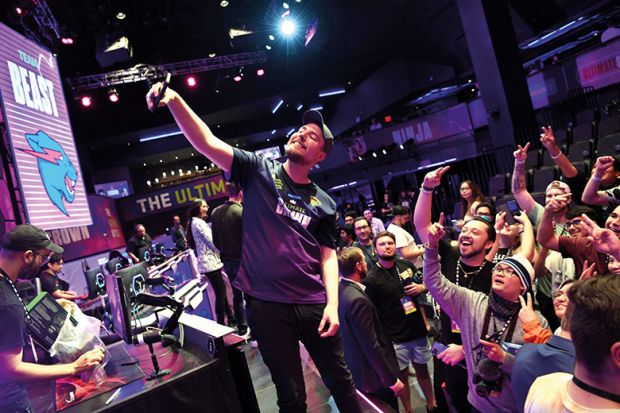The highest-paid content creator on YouTube, Jimmy Donaldson, has amassed more than 200 million followers with stunts such as being buried alive and daring people to survive a laser maze.
But one challenge has thwarted even Mr Donaldson, whose on-screen name is MrBeast: finding the talent he needs to produce his elaborate videos.
Now he has a surprising partner.
East Carolina University, in the town where Mr Donaldson stages his productions, is launching an online content creator training programme, which will teach such things as editing, camera work and analytics.
The idea is “to meet the educational needs of the creator economy at a critical moment in the evolution of this growing industry”, said Philip Rogers, the university’s chancellor.
It’s one of a fast-increasing number of programmes in social, digital and mobile media content creation and marketing being added by US universities in response to demand from not only influencers themselves, but also from students who aspire to become just like them – or at least to cash in on the supporting roles.
“It’s very valuable to have those sets of skills,” said Robert Kozinets, professor of journalism at the University of Southern California, who teaches a course called Influencer Relations and co-authored a textbook that came out in April titled Influencers and Creators: Business, Culture and Practice.
What he covers are not necessarily the practical roles of scripting, lighting, editing or sound design – although he does teach such things as negotiating contracts. He wants his students who might also go into journalism, advertising or public relations, which often engage influencers or use social media, to understand the quickly expanding industry.
“Some of this might be useful to them if they want to be in the business in some capacity,” Professor Kozinets said. “My approach to this is about looking at this whole thing as a phenomenon. It’s a very practical course that I teach, but not just for influencers themselves.”
That is a caution that other academics share. Universities should not be quick to capitalise on student demand for social media training, they say, without also offering them other skills.
“I don’t want to have a classroom full of students thinking, ‘This is all I need. I’m going to take this and that’s it,’” said Matthew Taylor, assistant professor of journalism at Middle Tennessee State University, who teaches a course in sports and social media.
“What are some things we can give them that actually are going to be of value beyond the sexiness of the topic? How can we take this skill and use it for an advertising or public relations agency or in business?”
Whatever their focus, programmes such as these are cropping up at all levels.
People who complete the content creation course at East Carolina will receive certificates. The programme will begin this academic year, a spokeswoman said, but has not yet started accepting applications.
Dr Taylor’s journalism students can qualify for a certificate in social media marketing by taking separate independent instruction online.
“We wrestle with the question of whether it’s best to provide specific social media coursework or to integrate social media into our existing courses,” he said. “Thus far, we have tended more towards the latter.”
Entry-level jobs in content creation start at about $50,000 (£39,600) a year, according to East Carolina University. Industry tracker HypeAuditor says “mega-influencers” earn an average of $184,000 annually from sponsorships, merchandising and subscriptions on social media sites including TikTok, Instagram and YouTube.
At 25, Mr Donaldson – who briefly attended East Carolina himself before dropping out – is worth $500 million, the business magazine Forbes estimates.
The programme he is developing with East Carolina will “connect cutting-edge techniques with the knowledge creation engine of a university”, said Dr Rogers.
Northwestern University offers a course in social media specialisation, and the Wharton School of Business at the University of Pennsylvania one in the fundamentals of digital marketing, social media and e-commerce. The University of Maryland has a certificate in digital advertising and social media.
Arizona State University teaches courses leading to certificates, bachelor’s and master’s degrees in social media marketing. Johnson & Wales University has an online bachelor’s degree-granting programme in digital marketing and social media. Pace University confers master’s degrees in social media and mobile marketing.
And Grand Canyon University has added a bachelor’s degree in social media, including how to design, write and produce content for social media, blogs, websites and email marketing, whose first students will graduate in the spring.
“At some schools, there are social media classes in the business department or the communication department,” said Sheila Schumacher, director of digital design programmes in Grand Canyon’s College of Arts and Media, where that course is housed. “Ours trains the designers – the people who are using social media. There was no one else doing that.”
After all, she said, “It made perfect sense that of course we should be teaching social media, because all of our students coming in are using it as their primary communication.”
Register to continue
Why register?
- Registration is free and only takes a moment
- Once registered, you can read 3 articles a month
- Sign up for our newsletter
Subscribe
Or subscribe for unlimited access to:
- Unlimited access to news, views, insights & reviews
- Digital editions
- Digital access to THE’s university and college rankings analysis
Already registered or a current subscriber? Login




